Provocation comes in many forms, not just slogans and guns. The unrest in certain spots in West Bengal following Ram Navami processions has allowed the state Bharatiya Janata Party to reiterate its criticism of the chief minister’s ‘appeasement’ policy and claim that law-and-order has broken down. The party apparently wishes to establish that the majority community is not safe in the state, perhaps to build up to further clashes between communities. Against this danger, the chief minister, Mamata Banerjee, posited a fundamental principle of a secular democracy and a peaceful society. Ms Banerjee appealed to the ‘brothers and sisters’ of the majority community to protect the minority community during Ramadan. This did have its practical side: the people can foil plans for communal conflict by refusing to respond to calls for violence and by defending the targets of it alongside the administration’s duties of prevention, control and arrest. But the real power of the appeal lay elsewhere. It reminded the majority that it was in a position to determine the way the state will go when communities were being pitted against each other, that communities have a fraternal, not an inimical relationship, that in a civilised and secular democracy, the larger number ensured security for the smaller.
Ms Banerjee’s call expressed concerns similar to those of B.R. Ambedkar, who had reminded the newly independent citizens of India that members of the minority community had trustingly placed their existence in the hands of the majority community and should not face discrimination. The reminder points towards a problem with electoral democracy. Ambedkar did say that the community mentioned was a religious not a political majority. That does not apply at the moment: the BJP’s reign at the Centre was achieved through the mixing of politics with religion. Electoral democracy always carries the risk of political and ideological domination by the party that wins the maximum votes; this risk is now an advantage. The ideals of equality, fraternity, care for the weak and vulnerable, rights to life and freedom, peaceful coexistence and other democratic principles are ultimately matters of choice; ironically, the electoral system allows their rejection. Today, the need for the majority to ensure the safety of the minority — whether it is Ramadan or not — has become urgent. Democracy would then flourish in spite of its problems.











